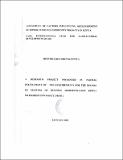| dc.description.abstract | Over the past 20 years, Kenya has benefited from about USD 122 million in
Funding from IF AD, representing one of IFAD's largest country portfolios for rural poverty alleviation in Africa. The IF AD loan funds are channeled through the treasury and accounted for through Government budgetary procedures. Projects are factored in the development budget, appearing in Government's Printed Estimates. The project spends and asks for replenishment through the Ministry of Finance and the lead Ministry which is the Ministry of Water and Irrigation. However desk review of IFAD in Kenya undertaken in June 2001 drew substantive conclusions about complex financial management procedures resulting in slow replenishment of IFAD funds. (IFAD Country Strategic Opportunities Papers 2002). Slow replenishment process is one of the factors that hinder effective implementation of community projects. Since there are various internal steps which have to be followed for funds to be approved. The research was carried out with the objective of examining the factors affecting replenishment of donor funds. It was concerned with the replenishment process which involves transfer of funds from the offshore account to the project account. The study sought to identify the objectives by assessing the processing procedures, communication and information flow, capacity in terms of experience, skills, staffing and technology in use and follow-up and monitoring. The study began in chapter one with a background of IF AD, current replenishment process then the study problem, research questions, objectives and significance of the study. The methodology adapted by the survey was descriptive. The research was based on the departments involved in the replenishment of donor funds. The target population was 135 officers which included the accountants, human resource staffs and disbursement staffs in the Ministry of Finance, Ministry of Water and Irrigation, Central Bank of Kenya and the Project Management Unit staffs. The data was collected by the use of questionnaires and was analyzed through descriptive statistics. The study findings in chapter four indicated that the main factors affecting the replenishment process were lengthy processing procedures as indicated by the time taken for transfer of funds , lack of proper communication and information flow between the departments, lack of staffs and lack of proper follow-up and monitoring at all levels. In this regard the Government and Donors should come up with practical and effective ways of improving the flow of funds and the replenishment process in order to speed up the implementation of community projects and achieve the projects objective of improving the welfare of the rural poor. | en_US |

